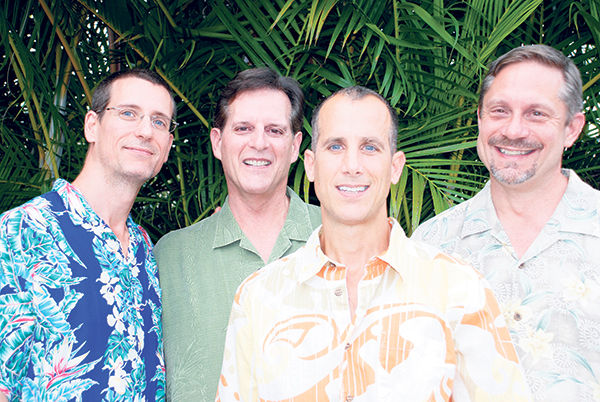LIHUE — Kauai Chamber of Commerce is looking to add local fashion as a Hawaii-made initiative in need of development support along with culture, food, agriculture, medical and tech. Chamber President and CEO Randy Francisco is working on a “Hawaii
LIHUE — Kauai Chamber of Commerce is looking to add local fashion as a Hawaii-made initiative in need of development support along with culture, food, agriculture, medical and tech.
Chamber President and CEO Randy Francisco is working on a “Hawaii Fashion Month Kauai,” an initiative to support small businesses that manufacture textiles and accessories. The Chamber will join the Hawaii Fashion Month in November to highlight the importance of the small businesses that make up this sector.
“Combined, they add to the county’s ‘Kauai Made’ program,” Francisco said.
Kauai has a designer in a Hanapepe town auto service shop, while a young entrepreneur prepares to manufacture bikini creations in downtown Kapaa. The clothing, jewelry, bags and other items reflect the island’s cultural diversity.
High Technology Development Corporation will also be looking to provide resources to emerging and established companies that would qualify for services and assistance in business development and manufacturing.
“Our goal is to increase the number of companies that are winning SBIR awards,” said HTDC Executive Director and CEO Robbie Melton. “It is small but significant.”
Kapaa-based Papalua Island LLC, better known by its brand names, “Hula Baby” and “Ko Bakery,” received HTDC support to help develop a merger of smaller companies.
The owners, Byron Barth, Chris Spinosa, David Schwartz and S. Morris Wise, attended the Made in Hawaii Festival this summer, with a booth sponsored by Innovate Hawaii and HTDC in partnership with the Department of Business, Economic Development and Tourism. The booth was part of a showcase that featured new companies in culture, fashion, tech and food business.
“We were given the opportunity to attend this event for reduced cost,” said Wise, co-owner and also known previously for Island Biscotti Company and Bake Shop. “The event gave us connections with businesses in Hawaii that were looking for more local Hawaii products to carry in their stores, or which had ingredients or products that we could source locally, benefiting each of our local businesses.”
Wholesale buyers from around the state and the Mainland gathered early on the first day to network with wholesale business, he said.
The event made them better connected with DBEDT and Innovate Hawaii, he added, and in particular help with understanding the needs arising from doing business in Hawaii and on Kauai, where negotiating shipping of ingredients and packaging can be very difficult.
“I don’t know exactly what our relationship with HTDC will be going forward, but it seems they have many programs that help small companies negotiate the ‘business’ of small business and grow,” Wise added.
Kauai Kookie co-manager Ruth Hashisaka said they worked with a consultant provided through HDTC over a decade ago.
“It was a business class with number of sessions with a facilitator who came in to map out strategic business planing,” Hashisaka said.
Trex Enterprises Corporation is a privately held company with headquarters in San Diego, and facilities in New Mexico, Massachusetts, and locally in Honolulu, Kauai and Maui.
The employee owned company receives federal support for development of dual-use technologies relating to the defense, homeland security and force protection.
As a subsidiary of Trex Enterprises, the Lihue-based Trex Advanced Materials received HTDC support to help manufacture high-purity CVC silicon carbide. The material has applications that include optical mirrors for telescopes in the aerospace industry, and mold support structures for replication optics in camera lens manufacturing.
“Quality control of this nature ensures business for the future,” said Fred W. Styer, CHMM, general manager of Trex Advanced Materials.
HDTC’s primary role is to administer federal and private grants and contracts in support of technology research. The goal is to develop Hawaii’s commercial high technology industry as a driver of the diversification of the economy and quality jobs.
SBIR grant programs are open to newly formed companies that are producing the priority needs of the country.
The Phase I funding ceiling doubled from $75,000 to $150,000. The Phase II ceiling went from $750,000 to $1 million.
“The great news is that they just raised the amount of funding of the federal programs,” Melton said. “That is a pretty good chunk of money to develop your proof of concept and go beyond to the next stage of development. If the need for a particular product is determined a priority then the caps can be lifted.”
HDTC can also assist emerging companies of new technologies with patenting and intellectual property filings. It can assist with a three- or five-year application plan for leading edge tech development space at incubators programs on Oahu and Maui.
“Right now there is no incubator on Kauai,” Melton said.
For information contact Sandi Kanemori at (808) 539-3616 and email info@htdc.org.



